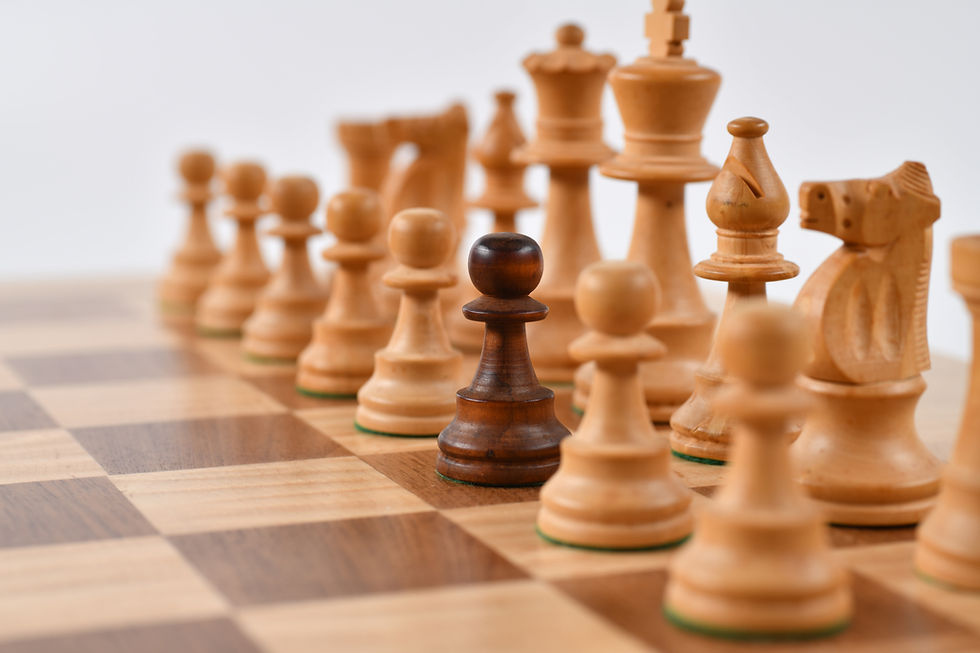Common Mistakes of the Chess Adult Improver
- jpverow7007
- Apr 7
- 3 min read
Updated: Apr 17
This is a blog for anyone trying to improve their chess game.

Hello Chess fans! I want to share my lessons learned from my own chess journey thus far. I started taking my chess seriously 7 years ago at age 26. I can tell you with confidence what has worked for me, and what has not. As of writing I have a Lichess Rapid peak rating of 1978 with almost 3,000 rapid games played. When I first began on Lichess, I was in the low 1400’s.
I am a firm believer that anyone, starting at any age, can achieve impressive chess goals with the right attitude and methods. Here are some of the most important things I’ve learned that will jump start your own chess journey.
The chess time control you are playing makes a huge difference
The slower the better. I recommend 15+10, but if you can find a friend to play a slower time control regularly, do it. Chess is a wonderful game that is made up of many moving parts. You need to be deliberate in working on each of the parts before they begin to make sense as a whole. The reason famous chess streamers can effortlessly play 10 games of blitz and make it look easy, is because they have 100’s of thousands of hours of practice already completed. They see and understand things beginner chess players are not yet able to imagine. Beginners need to take more time, and that’s ok!

Tactics Tactics Tactics!!
You need to learn all of the tactical patterns though solving many tactics puzzles. Tactics are simple combinations of moves used to gain an advantage. Forks, pins, skewers, discovered checks, deflection, and many more of these ideas exist. Tactics exist in all phases of the game, and are the building blocks of every strategy.
Beginners often underestimate how many puzzles they need to solve to begin seeing results. We’re talking thousands at a minimum. You should also solve them with a mind to understand how those patterns arise. Give yourself a few minutes to solve the problem, try and visualize the answer WITHOUT MOVING ANY PIECES all the way to the end. It helps to write your answer down before checking it with the engine. That way you are not able to lie to yourself, believing “ah yeah, I saw that”.
The opening doesn’t matter very much right now
The opening generally serves two purposes. The first is to get your pieces out. Plain and simple. Imagine playing a football game with only two players against a team of sixteen. Chess is a game of two armies. By bringing out all of your forces, you will maximize your chances to crush the opponent.
The second purpose of the opening is to achieve a middle game position you understand better than your opponent. Unless your opponent is a titled player, you can beat them with any opening. Maybe you like open positions with no pawns in the center, so you can create sharp tactical games. Perhaps you prefer closed positions like the French, where you slowly maneuver your pieces to gain an advantage over time. Or maybe you don’t know what you like because you’re just starting out! Don’t worry about which opening you’re playing. Just get your pieces out (and castle).

It's way more important to make less mistakes than to find the best moves.
Stop playing backwards knight moves!
This one has some nuance so hear me out. I hit a wall for over a year trying to go from 1700 to 1800 Lichess. I was doing tactics every day. I tried learning basic middle game plans, and I had studied the basic endgames. It was a mystery to me to discover what my game was lacking, and I couldn’t figure it out with just the engine.
I hired a coach for a few lessons. We sat down and looked at some of my online and OTB tournament games. I was surprised at his level of disgust when he saw I was often retreating my pieces (mostly knights). There’s exceptions to every rule in chess, but for the most part you want to move your own pieces forward and the opponent’s pieces back. Imagine a game where both players got their knights and bishops out, then after castling the first player put both their knights back on their starting squares. That’s what you’re doing if you play unnecessary retreating moves.

These five points are an excellent place to start for any player’s chess journey. If you want to see improvements to your game, give yourself plenty of time to hammer away at these ideas and enjoy the process. Happy studying!




Comments